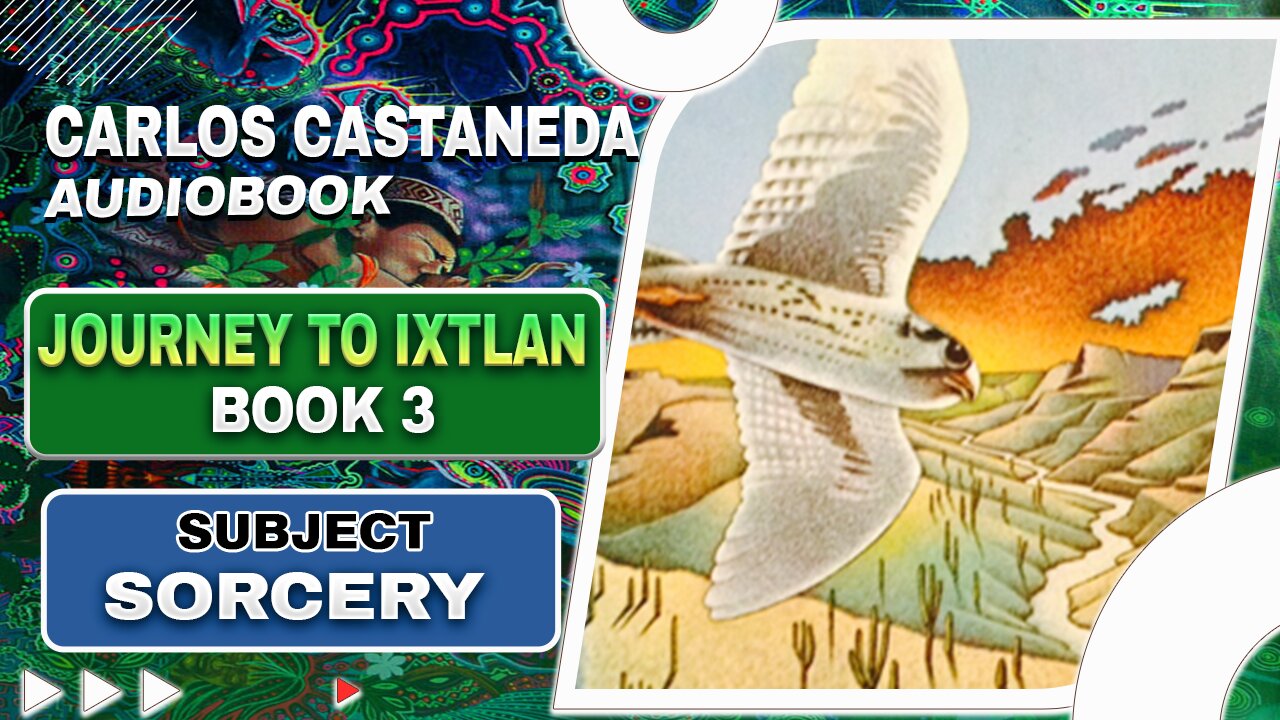Premium Only Content

Journey to Ixtlan by Carlos Castaneda | Full Audiobook
🕧 KEY MOMENTS IN THIS VIDEO 🕧
00:00:20 - Introduction
00:17:57 - Part 1: Stopping the World
00:18:08 - Reaffirmations From The World Around Us
00:37:24 - Erasing Personal History
00:58:24 - Losing Self-Importance
01:16:46 - Death is an Adviser
01:41:50 - Assuming Responsibility
02:08:16 - Becoming a Hunter
02:35:10 - Being Inaccessible
03:02:22 - Disrupting the Routines of Life
03:19:48 - The Last Battle on Earth
03:45:11 - Becoming Accessible to Power
04:24:35 - The Mood of a Warrior
05:02:19 - A Battle of Power
05:45:52 - A Warrior's Last Stand
06:24:36 - The Gait of Power
07:26:20 - Not-Doing
08:11:50 - The Ring of Power
08:43:52 - A Worthy Opponent
09:19:56 - Part Two: Journey to Ixtlan
09:20:00 - The Sorcerer's Ring of Power
09:55:18 - Stopping the World
10:22:46 - Journey to Ixtlan
Hello and welcome to the Ancient Wisdom Modern Mind podcast and today I would like to share with you Journey to Ixtlan which is the third book by Carlos Castaneda, published as a work of nonfiction by Simon & Schuster in 1972. It is about an apprenticeship to the Yaqui "shaman," Don Juan.
The title of this book is taken from an allegory that is recounted to Castaneda by his "benefactor" who is known to Carlos as Don Genaro ( Genaro Flores ), a close friend of his teacher don Juan Matus. "Ixtlan" turns out to be a metaphorical hometown ( or Place / Position of Being ) to which the "sorcerer" or warrior or man of knowledge is drawn to return, trying to get home. After the work of "stopping", his changed perspective leaves him little in common with ordinary people, who now seem no more substantial to him than "phantoms." The point of the story is that a man of knowledge, or sorcerer, is a changed being, or a Human closer to his true state of Being, and for that reason he can never truly go "home" to his old lifestyle again.
In Journey to Ixtlan Castaneda essentially reevaluates the teachings up to that point. He discusses information that was apparently missing from the first two books regarding stopping the world which previously he had only regarded as a metaphor.
He also finds that psychotropic plants, knowledge of which was a significant part of his apprenticeship to Yaqui shaman don Juan Matus, are not as important in the world view as he had previously thought. In the introduction he writes.
-
 11:36:11
11:36:11
Jason Cain
1 year agoThe Eagle's Gift by Carlos Castaneda | Full Audiobook
2331 -
 18:38
18:38
The Lou Holtz Show
18 hours agoLou Holtz: "Trump Stands for America—And He Means It!" | Ukraine, Pete Rose & Common Sense 🇺🇸
12.9K3 -
 3:54
3:54
Randi Hipper
18 hours ago$100,000 BITCOIN COMING! HERE'S WHY
8.62K2 -
 9:34
9:34
ariellescarcella
11 hours ago"Born This Way Is A Lie" : Religious Debate
10.9K4 -
 6:05:13
6:05:13
Akademiks
15 hours agoDay 1/30. Drake Drops lawsuit vs iHeartMedia? Offset and Cardi Calls it Quits. 50 v Jim Jones?
152K12 -
 2:55:11
2:55:11
TimcastIRL
12 hours agoDemocrat TANTRUM At Trump Speech BACKFIRES, Trump Polls UP, Dems UNDER FIRE w/67Kevin | Timcast IRL
223K112 -
 1:25:23
1:25:23
Kim Iversen
14 hours agoFrom Doctor to Political Prisoner: Dr. Simone Gold on COVID Lies, January 6th, and Medical Tyranny
128K79 -
 2:09:28
2:09:28
Melonie Mac
15 hours agoGo Boom Live Ep 39!
83K11 -
 1:04:36
1:04:36
Man in America
17 hours ago🚨 BREAKING: Dr. Robert Young JAILED! Medical Tyrants Will Do ANYTHING to Silence Truth
101K53 -
 3:01:44
3:01:44
I_Came_With_Fire_Podcast
15 hours agoPanama CANAL BlackROCKED | Left of PODCASTING | Ukraine AID GONE
55K8